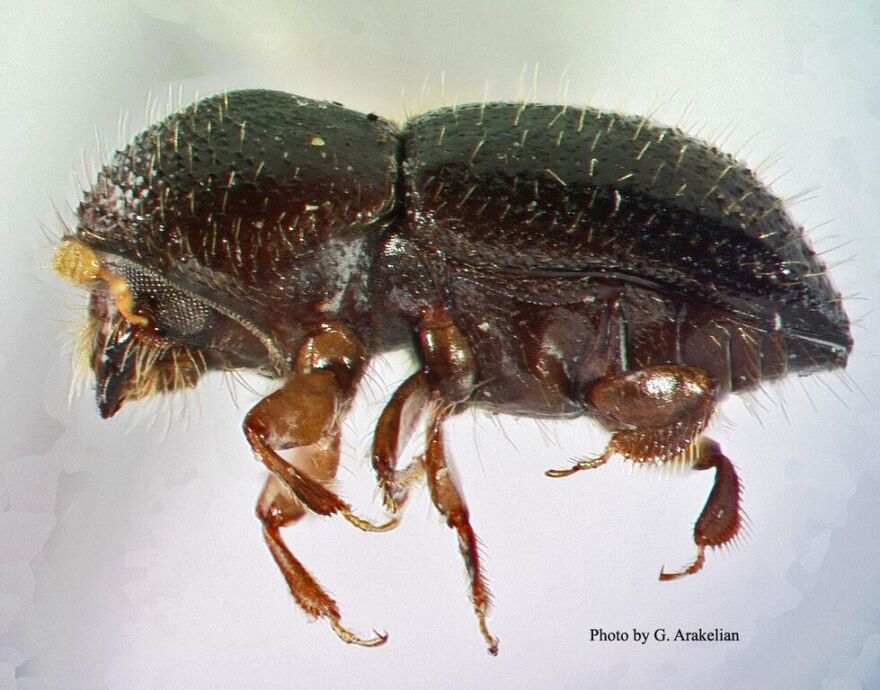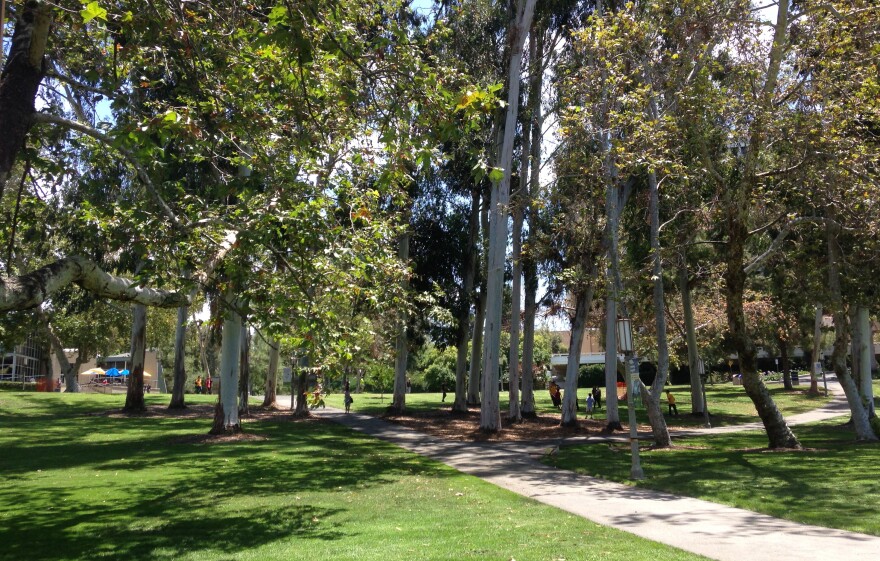With our free press under threat and federal funding for public media gone, your support matters more than ever. Help keep the LAist newsroom strong, become a monthly member or increase your support today .
Scientists bet on parasitic wasps to beat shot hole borer
Scientists at the University of California, Riverside have identified a small, parasitic wasp from Taiwan that could help suppress Southern California’s growing polyphagous shot hole borer infestation. In the past few years, the pest is estimated to have killed as many as 40,000 trees in the region.
During a trip to Taiwan last month to study the borer's native habitat, the team of scientists observed the new wasp species in an avocado grove. They named it Sinuatophorus, and collected several live wasps to bring back to Riverside.
The wasp, a natural predator of the Taiwanise borers, stings the beetles while simultaneously laying its eggs inside their bodies. Two to three weeks later, a new wasp emerges from inside the beetle's body, killing it.
Richard Stouthamer, a professor of entomology at U.C. Riverside, hopes the discovery will eventually lead to introducing the wasps to Southern California as a long-term solution to the region’s borer infestation. This month, he will lead an effort to breed a quarantined colony of the wasps in Riverside and study them for up to two years, he said.
“The really hard part about all of this is that nobody has ever reared these things successfully – or even tried,” he said. “We’ve had to sort of invent the wheel.”
Once the Riverside colony gets going, the scientists will conduct tests to find out if the wasps will only target the shot hole borer – not other species of beetles in Southern California, such as ladybugs, Stouthamer said. If the wasps target other species during experiments, it likely won’t be released into the wild, he said.
If the wasp only targets the borers, Stouthamer will petition the United States Department of Agriculture to allow them to release the wasps in controlled areas. If successful, the introduction of wasps could be a natural, cheap way to reduce the borer’s growth long-term, Stouthamer said.
Here’s what one of the wasps looks like as it enters a beetle-infested avocado tree in Taiwan:
The first shot hole borer in Southern California was discovered in an avocado tree in 2012, according to a KPCC report. Since then, the beetle has spread to more than 137 species of trees.
In four years, the borers caused Orange County more than $175 million in tree inventory loss, according to the Orange County Department of Parks and Recreation. Another $20 million is being spent each year to research the beetle's spread across Southern California, according to the department.
With no long-term defense against the borers, their numbers, along with the numbers of dead trees, are expected to keep rising over the next few years.
It’s difficult to stop the borer for several reasons, according to Akif Eskalen, a plant pathologist at U.C. Riverside. The beetles have no native predators in Southern California. Available pesticides, fungicides and bacterial defense mechanisms wear off after less than a year, he said.
Eskalen gets pleas from homeowners with infested trees almost every day, inquiring about a way to beat the borers, he said. But for now, he tells them there’s not much he can do.
While he remains optimistic about the wasp's potential, Eskalen said he's concerned. Previous attempts to release other species of parasitic wasps in different parts of the world have failed due to undetermined causes, he said.
“We still want to explore and try our chances because we don’t have another good alternate,” he said.
At LAist, we believe in journalism without censorship and the right of a free press to speak truth to those in power. Our hard-hitting watchdog reporting on local government, climate, and the ongoing housing and homelessness crisis is trustworthy, independent and freely accessible to everyone thanks to the support of readers like you.
But the game has changed: Congress voted to eliminate funding for public media across the country. Here at LAist that means a loss of $1.7 million in our budget every year. We want to assure you that despite growing threats to free press and free speech, LAist will remain a voice you know and trust. Speaking frankly, the amount of reader support we receive will help determine how strong of a newsroom we are going forward to cover the important news in our community.
We’re asking you to stand up for independent reporting that will not be silenced. With more individuals like you supporting this public service, we can continue to provide essential coverage for Southern Californians that you can’t find anywhere else. Become a monthly member today to help sustain this mission.
Thank you for your generous support and belief in the value of independent news.

-
The historic properties have been sitting vacant for decades and were put on the market as-is, with prices ranging from $750,000 to $1.75 million.
-
Users of the century old Long Beach wooden boardwalk give these suggestions to safely enjoy it.
-
The Newport Beach City Council approved a new artificial surf park that will replace part of an aging golf course.
-
The utility, whose equipment is believed to have sparked the Eaton Fire, says payouts could come as quickly as four months after people submit a claim. But accepting the money means you'll have to forego any lawsuits.
-
The City Council will vote Tuesday on a proposal to study raising the pay for construction workers on apartments with at least 10 units and up to 85 feet high.
-
The study found recipients spent nearly all the money on basic needs like food and transportation, not drugs or alcohol.










